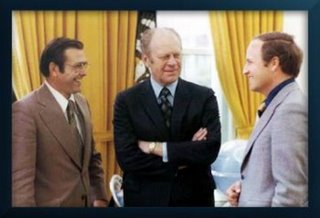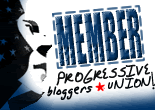Gerald R. Ford's Legacy: Our Long National Nightmare Is Not Yet Over
I'm sorry that President Ford has died.
I'm also sorry that he always valued political party power over principle.
Republicans established the Policy Committee by Conference Resolution on January 26, 1949. For its first ten years, Republican Leader Joe Martin (MA) served as chairman. In 1959, the Conference unanimously elected Rep. John Byrnes (WI), the ranking Republican on the Ways & Means Committee, as chairman after junior Members sought to strengthen the Committee to modernize GOP policy. In 1963, under Conference Chairman Gerald Ford, the Conference amended its rules to increase the number of newer Members on the Committee so that it more broadly represented "forward-looking Republican thinking." With the support of Rep. Don Rumsfeld (IL), future House Republican Leader Rep. John Rhodes (AZ) succeeded Rep. Byrnes in 1965, and served until 1973. Subsequent chairmen were future World Bank President Barber Conable (NY, 1973-77); Rep. Del Clawson (CA, 1977-79); Rep. Bud Shuster (PA, 1979-81); the current Vice President, Dick Cheney (WY,1981-87); future Conference Chairman Jerry Lewis (CA, 1987-89); Rep. Mickey Edwards (OK, 1989-93); and current International Relations Chairman Henry Hyde (IL, 1993-95). Rep. Christopher Cox (CA) was elected Policy Chairman when Republicans won the House Majority in 1994.
With the fall of South Vietnam in 1975 as background, Congress (Democratic control) and the President struggled repeatedly over presidential war powers, oversight of the CIA and covert operations, military aid appropriations, and the stationing of military personnel.
On May 14, 1975, in a dramatic move, Ford ordered U.S. forces to retake the S.S. MAYAGUEZ, an American merchant ship seized by Cambodian gunboats two days earlier in international waters. The vessel was recovered and all 39 crewmen saved. In the preparation and execution of the rescue, however, 41 Americans lost their lives.
The facts are that in the last 2 years, I have submitted to the Congress and to the American people the two largest defense budget requests in the history of the United States in peacetime. Those requested appropriations for the best military personnel, the strongest weapons, the best planning by the Army, Navy, Air Force, and Marines, will give us the capability to deter war and to preserve our national security.
This kind of a program should reassure our allies on a worldwide basis, and this kind of a program should invite cooperation from any party that we negotiate with. Let me assure you that this administration will stand tall and strong in seeking peace through strength.
On September 9, 1974, Ford pardoned Nixon for any "crimes he committed or may have committed." The pardon was the result of several weeks of negotiation between the Ford Administration and Nixon, then living at San Clemente, California. Analysts have speculated that the president may have wanted to pardon Nixon to eliminate the problem of Watergate once and for all: Ford ordered his chief negotiators—his former law partner Philip Buchen, now the chief counsel to the president, and lawyer Benton Becker—not to drive too hard a bargain.
As a result, the final pardon allowed Nixon to keep restricted access to the Watergate tapes and did not require him to apologize to the American people for his actions. Many observers suspected that the pardon, issued largely on Nixon's terms, had been arranged prior to the resignation. However, Buchen emphatically asserted that there had been no secret agreements made between Nixon and Ford.
Nevertheless, the pardon ended any chance Ford might have had to establish his own presidency. His press secretary, Jerald terHorst, resigned rather than support the pardon. Confirmation of Ford's nominee for vice president, former New York Governor Nelson A. Rockefeller, was held up for three months. Congress forced Rockefeller to publicly disclose his wealth and undergo a series of cross-examinations that many argued made it impossible for Rockefeller to be influential in the Ford Administration. Ford himself was called upon to testify in October 1975 to a House Judiciary Committee subcommittee that was investigating the pardon. The first president since Abraham Lincoln (1861-1865) to testify in person, Ford was clear to the committee: "There was no deal, period."
Even this extraordinary appearance did not lessen press criticism of Ford, which had begun as soon as the pardon was announced. A large part of this criticism was extensive coverage of Ford's apparent clumsiness— he tripped and fell down the stairs of the presidential airplane in Austria, and was filmed several times falling down while skiing. Even two assassination attempts in 1975, both in California, failed to generate any substantial popular support for the president.
Ford said he did not regret his pardon decision, but added that it generated more of a political backfire than he expected.
"I knew it would be controversial," he said. "It turned out to be much more unpopular at the time than I anticipated, but that made no difference whatsoever. I never backed off because it was the right thing to do."

Sigh.
Best bar bet in the world: Delilah didn't do it.
Judges 16:19-- And she made him (Samson) sleep upon her knees; and she called for a man, and she caused him to shave off the seven locks of his head.







2 Comments:
I'm loving Portland, but my email/ postings have been completely messed up (AOL and Comcast broadband are a shit*y mix). You don't have to post this, but just want to share. I received an email about this from C. Sheehan and it said she felt if he hadn't pardoned Nixon we wouldn't be dealing with Iraq... well, this upset me until I talked to my soon to be twelve year old son about law and I realized that she is right...
Hope you are well. If you are ever up in the Pacific Northwest, send me an email, and I'd love to take you out for a coffee. (I went to Vancouver, WA for the first time today and thought of you.)
-Kat
I'm loving Portland, but my email/ postings have been completely messed up (AOL and Comcast broadband are a shit*y mix). You don't have to post this, but just want to share. I received an email about this from C. Sheehan and it said she felt if he hadn't pardoned Nixon we wouldn't be dealing with Iraq... well, this upset me until I talked to my soon to be twelve year old son about law and I realized that she is right...
Hope you are well. If you are ever up in the Pacific Northwest, send me an email, and I'd love to take you out for a coffee. (I went to Vancouver, WA for the first time today and thought of you.)
-Kat
Post a Comment
<< Home